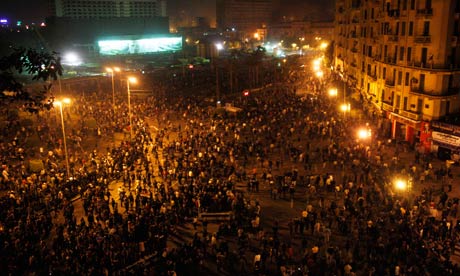Mubarak defiant in face of Egyptian protests
• At least 25 killed on day of violent protest
• Mubarak stays but dismisses government
• Demonstrators defy nationwide curfew
• Mubarak stays but dismisses government
• Demonstrators defy nationwide curfew
- The day's events as they happened
- Cairo in flames as cities become battlegrounds
- Interactive: Flashpoints across the country
- White House warns $1.5bn aid could be withdrawn
- Hillary Clinton on the Egypt protests
- Cables reported 'routine' police brutality in Egypt
- Hosni Mubarak addresses Egyptian public
- Simon Tisdall: White House wobbles on tightrope
- Egyptian protesters defy Cairo crackdown
- Egypt gripped by violent protests
- Editorial: a pivotal moment
Egypt protesters defy curfew as tanks roll into Cairo
• At least 25 killed on day of violent protest
• Mubarak stays but dismisses government
• Demonstrators defy nationwide curfew
• Mubarak stays but dismisses government
• Demonstrators defy nationwide curfew

Tanks moved on to the streets of Cairo and Alexandria as protesters in Egypt defied a nationwide curfew ordered by President Hosni Mubarak in an effort to quell the fourth and most violent day of demonstrations against his 30-year rule.
In a late-night TV address, Mubarak refused to relinquish power, but dismissed his government, promising a new administration to tackle unemployment and promote democracy.But his call for stability appeared to cut little ice with many protesters, who surged on to the streets as soon as he finished speaking, defying a curfew. Protesters who had earlier been forced into nearby side streets by the military could be heard chanting "People want to change the regime" immediately after Mubarak's broadcast to the nation finished.
One eyewitness said that a small fire had been set at the Mogama building, housing several government offices in the central Tahrir square, which was shrouded by clouds of smoke and teargas.
Mubarak, in his first public appearance since unrest broke out four days ago, said on state television: "It is not by setting fire and by attacking private and public property that we achieve the aspirations of Egypt and its sons, but they will be achieved through dialogue, awareness and effort."
Two weeks to the day after Tunisia saw its veteran president flee into exile, the capital of the Arab world's largest country witnessed extraordinary scenes as tens of thousands of demonstrators braved teargas, rubber bullets and baton charges to vent their fury at repression, poverty, unemployment and corruption.
Medical sources said at least five protesters had been killed and 1,030 wounded in Cairo. Thirteen were killed in Suez, and six in Alexandria. A teenager was shot dead in Port Said, al-Jazeera reported.
The toll of wounded from other towns and cities was not immediately available.
Demonstrators were reported to have stormed the Egyptian state television building in the centre of Cairo.
During the day, protesters all over the capital, many of who wrapped themselves in Egyptian flags to show their protest is patriotic, chanted "Mubarak out, Mubarak out" and waved signs proclaiming "game over".
Barack Obama last night warned Mubarak that he must reform his regime and refrain from violence against protesters. But the US president's message suggested Washington would go on supporting its longstanding ally for now."When President Mubarak addressed the Egyptian people tonight he pledged a better democracy and greater economic opportunity," said Obama. "I told him he has a responsibility to give meaning to those words. To take concrete steps and actions that deliver on that promise. Violence will not address the grievances of the Egyptian people, and suppressing ideas never succeeds in making them go away."
In another significant development, Mohamed ElBaradei, the former UN weapons chief who may stand in presidential elections later this year, was placed under house arrest for "his own protection" after returning from abroad.
The appearance of the army on the streets of Cairo last night was met with a mixed response in different areas of the city. In Tahrir square, the Guardian saw an angry crowd torch two army scout cars after seizing control of them and dragging the soldiers out. Other members of the crowd attempted to protect the injured soldiers, one of them shouting "we salute you". There were conflicting reports as to whether the army had been firing on the crowd.
"The soldiers were overpowered after they arrived in the square. The people don't know if they are on the people's side, or the side of the police," said Sabri al-Ahmed. "But we're looking after them now. We're not ignorant people. We Egyptians are kind people."
In the square, the sound of continued fighting was still clearly audible in the area of the American University, near the ministry of the interior, while vehicles were burning in front of the parliament building. From the headquarters of Mubarak's National Democratic party, flames were billowing from every window.
Events accelerated after Friday prayers, with disciplined crowds moving from mosques shouting and raising their hands in an outburst of anger and energy in response to leaflets advising on tactics, slogans and targets.
"No one has the right to control you but God," was the message of one sermon relayed by loudspeaker. "You have the right to speak out, only do it peacefully." There was little sign of an organised involvement by the Muslim Brotherhood, the biggest opposition force in Egypt, perhaps because it is biding its time to see how things develop.
Mass protests were also staged in Suez, where tanks were reportedly deployed, and Alexandria. Al-Jazeera said 80,000 people were demonstrating in Port Said.
The unrest has widened to include Egyptians from all walks of life, old and young, the middle classes and the urban poor. Those who did not take to the streets waved from their balconies or threw water bottles and onions to people in the crowd below to be used against teargas. Others handed out paper facemasks.
Soumaya Ghannoushi, page 32 Leader comment, page 34
